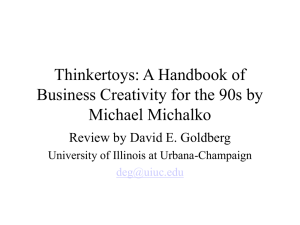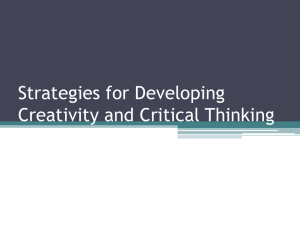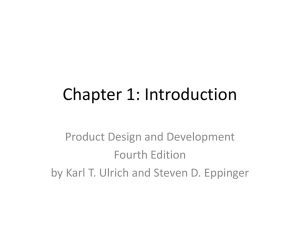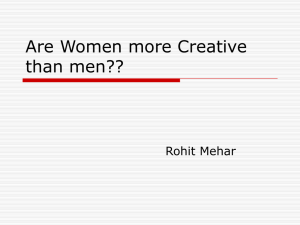Thinkertoys
advertisement
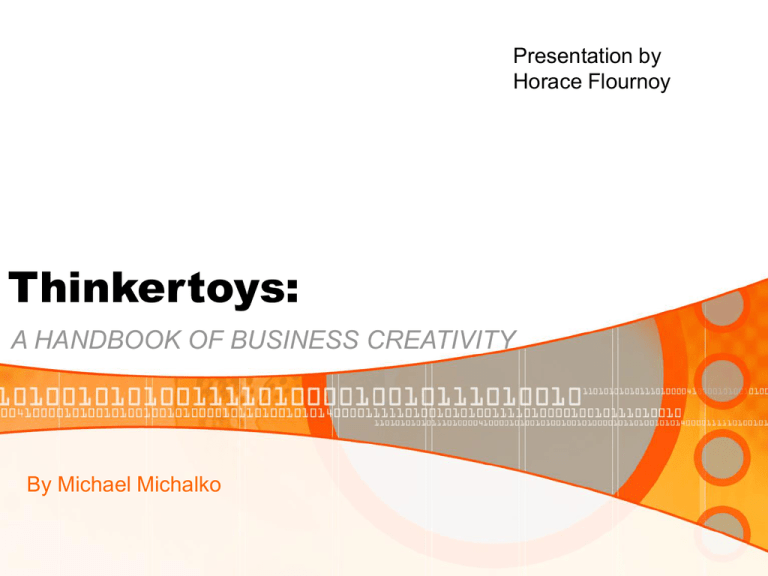
Presentation by Horace Flournoy Thinkertoys: A HANDBOOK OF BUSINESS CREATIVITY By Michael Michalko “Warning: This Book is for Monkeys” “Your business attitude determines your potential for innovation, creativity, even genius, and success in your field.” This introductory line in text must be realized throughout one’s reading of the text. Some of the Thinkertoys, or creative execercises indetended to spark ideas and innovation, can be abstract. However, there is a reward for open-minded individuals who can attack this book with a great attitude. Monkeys vs. Kittens • Monkey: takes an active role in ensuring its survival as a youth • Kitten: takes a passive, “do nothing but mew until its mother comes and carries it to safety” role. • Mickalko wants active readers to experience this book. • “Thinkertoys is designed for the “monkeys,” who are willing to work on themselves, work to develop their business creativity, and work on coming up with innovative ideas…and are ready to enjoy the very real benefits of that work.” Ideas Book stresses looking at some of the same ordinary things that you experience everyday in a “new and different” way. Looking at information differently will generate new ideas and unique insights. Your future will be shaped by innovation occurring right now, today. The consistency of new ideas Michalko wants the reader to realize that new and great ideas don’t always come by chance or through luck. Author wants to strip the “mystique” away from creativity. Like all other things the ability to come up with innovative ideas consistently takes practice. Therefore, this book is indented for all audiences, not just people that believe they are creative. Theory behind Thinkertoys The Thinkertoys found in this book are a means to generating great ideas consistently. They train the reader on how to get new ideas. “They are specific, hands-on techniques that enable you to come up with big or small ideas; ideas that make money, solve problems, beat the competition, and further your career, ideas for new products and new ways of doing things.” Theory behind Thinkertoys and Disclaimer • Thinkertoys only suggest the creative experience, but do not render it. • Once again, I believe that the success that comes from reading this book is dependent upon an open and almost childlike way of looking at things. • But, even for the individuals that actually do and use the techniques, are great ideas guaranteed? • The answer is… YES! • But first, we must go back to the first line of the book: “Your business attitude determines your potential for innovation, creativity, even genius, and success in your field.” Michalko claims that studies have been made that prove that creative people are people that believe they are creative and for the non-creative people that opposite is true. In order to bring new and creative ideas out of you, you must control your mind… Positive Thinking • “You can condition yourself to trigger a particular chemical pattern in your brain that will affect your attitudes and your thinking in positive ways.” • In order to do this, one must stop FUDs (Fear, Uncertainties, Doubts) from controlling his/her life…. • 2 powerful levers for changing beliefs and overcoming fears: 1) The belief that one is capable of doing one’s share and can exert a certain amount of independence. 2) The belief that there is something inside one that makes one equal in talent and ability to the rest of the world… Both of these solutions have the word “belief” in them…but is this a disguised psychology book? Playing with the Thinkertoys • “You can best profit by playing with these toys, in your own unique style, to stimulate ideas from your imagination.” • Maybe one or two Thinkertoys work best for you and while all of them might not work, the author suggest using a variety. • Solutions don’t stop at the idea or new breakthrough. • They must be developed… Developing Ideas • Some people stop thinking as soon as they have an answer. • “But some answer are better than others: They cost less, afford more status, are made better, easier to use, more aesthetic, are easier to install, or whatever.” • The creative minded individual must always be aware that there is a possibility of a better route or invention. • Use the Thinkertoys! (Work with one at a time, Select one linear and intuitive Thinkertoy to take advantage of both sides of your brain and select a Thinkertoy at random. Quantity • In the case of generating ideas, quantity is better that quality. • You must allow yourself to come up with multiple ways to solve problems • Alex Osborn stated that “The more sights that you take, the more likely you are to hit port.” • With all the generated ideas, it is important to sift through them. Steps to sifting through ideas • Inventory all the ideas in the sequence in which they occurred. • Browse through the list • Develop criteria for judging the ideas. They should be ideal criteria Assumption reversal • Escape from looking at a challenge in the traditional way. • Free up information so that it can come together in new ways. • Think provocatively. You can take a novel position and then work out its implications • Look for a breakthrough. Thinkertoy Example • Da Vinci’s Technique • Pg. 263
